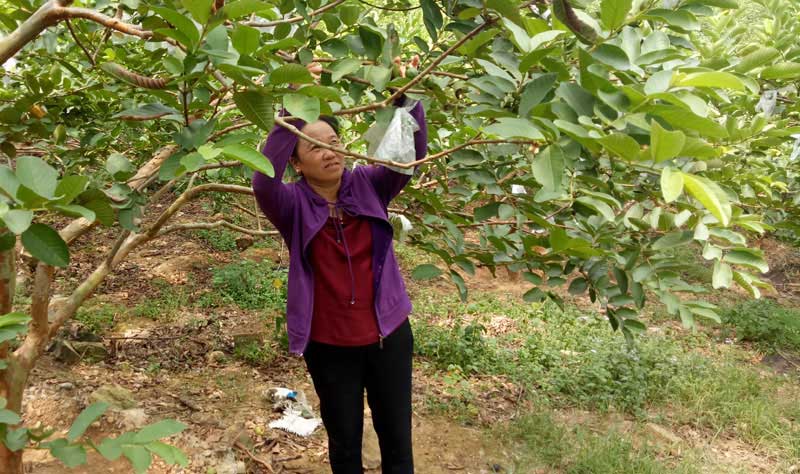



Mrs. Le Thi Hue, Bac Yen village is taking
care of the family’s guava garden.
Bringing us to visit the guava garden, Mr.
Dinh Chi Duyen in Moi Mit helmet said: "My family has a garden land of 7000
square meter. At first, we had the intention to grow citrus fruit trees, but we
needed a large amount of money. Thus, we
decided to plant guava trees. I myself brought the soil and water samples to
the State Breeding Institute to meet the consultants. They told me that the
soil and land in there can be suitable with a variety of plants, including the
guava trees. As a result of this, we decided to buy the seeding from the
Institute for the investment to grow guava. My family planted guava trees in
2015, initially 250 pear-guava trees from Taiwan. They were harvested at the
end of 2016 and since 2017 they have been harvested for the stable revenue of
more than 1 ton with the price of 25,000 VND/kg.
According to Mr. Duyen, the process of caring
for guava is not too difficult. When being planted, seedlings need appropriate
fertilizer. When the guava fruits are as big as forefoot, they must be covered
with two layers of nylon and sponge to avoid yellowing and suntan. The guava
fruits are sealed in the wrap until they mature for harvest during a period of
more than two months
Thus, it takes about 100 days from the fruit
blooming, wrapping the plastic to harvest. However, guava fruits are all year
round, so they can be harvested weekly. Therefore, guava trees can bring high
economic efficiency to many households in Yen Mong. It is remarkable that the
guava growers of in the area have been trained and they are capable of intensive
farming. 100% of farmers apply the caring procedures using bio-products and
organic fertilizer mixed with lime to ensure the food safety and non-
environmental pollution. Especially, the trading area of guava, people often
use nylon bags to prevent insect pests, hoarfrost, yellow fly. They also use
plant protection products to increase productivity by about 20%. At the same
time the price of guava covered products has also increased 2-3 times compared
with non-covered ones.